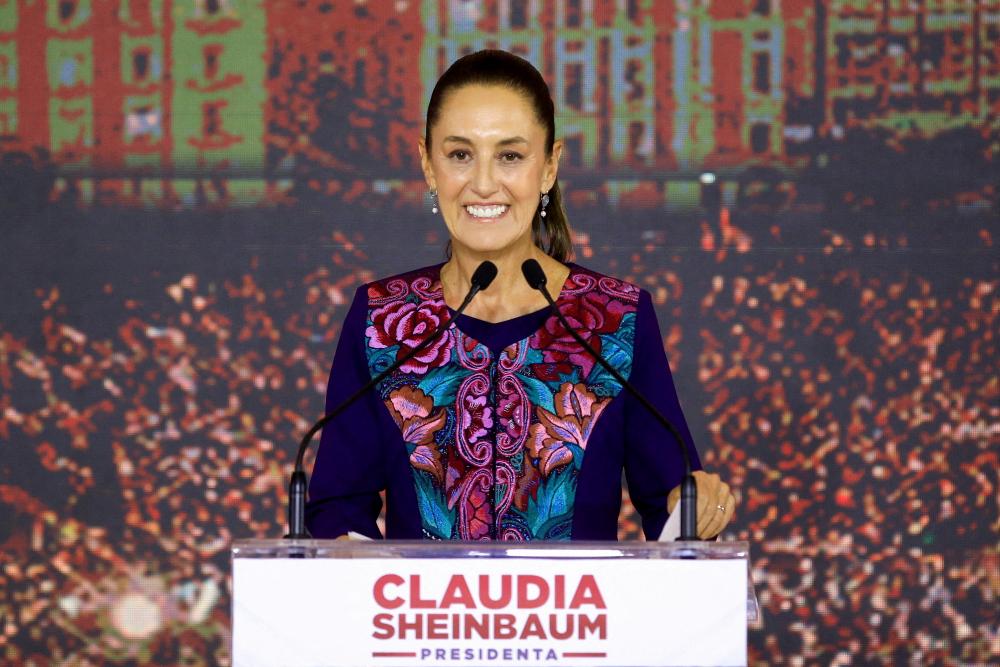The month before Mexico’s presidential election on June 2, the country was plagued by water shortages and power outages. record heat wave took the country beyond red and into an ominous purple on the weather map.
Like dehydrated monkeys fell dead from the treesthe crushing victory of Claudia Sheinbaum, a climate scientist, may seem like salvation. But her account paints a more complicated picture – one in which climate beliefs often come, and perhaps still do, second only to political pragmatism.
Sheinbaum will inherit a country that has slipped away frontrunner is lagging behind on climate policy – partly as a result of the policies of her predecessor and ally Andrés Manuel López Obrador, which she has pledged to continue.
López Obrador, from the oil-rich state of Tabasco, prioritized “energy sovereignty” by increasing the role of state-owned companies and pushing for self-sufficiency.
Related: Mexico was once a climate leader, but is now investing heavily in coal
This was reflected in a $17 billion oil refinery and colossal cash injections and tax cuts for Pemex, the most indebted state oil company in the world, and one of the largest historical polluters.
One result was the embedding of a matrix of dirty energy almost 80% derived from fossil fuels.
Meanwhile, Mexico’s climate commitments continued to falter. It is one of only two G20 countries that does not have a net zero target, and that is true A 35% reduction in emissions by 2030 under the Paris Agreement is still a long way off.
“Not only are we nowhere near there yet, but we also have no specific and detailed plans to get there, let alone funding and concrete infrastructure projects,” said Diego Rivera Rivota, a researcher at the Center on Global Energy Policy from Columbia University.
This despite the fact that Mexico is very vulnerable to climate change – as was driven home by the extraordinary hurricane that hit Acapulco in October 2023, killing dozens and causing catastrophic damage.
“Acapulco has taught us a big lesson. We were not prepared for that,” said Gustavo Alanís, general director of CEMDA, an environmental NGO. “These floods, droughts, hurricanes and heat waves will not only continue, but may become more severe and frequent.”
Many hope that Sheinbaum’s background as a climate scientist — one who contributed to the reports of the Nobel Prize-winning Intergovernmental Panel on Climate Change — will come to the fore once she takes power on Oct. 1, despite her confidence in López Obrador to win the presidency.
When she was mayor of Mexico City, there were certain signs of the approach she would take as president, with an emphasis on solar energy, electrified public transportation and a new cable car line.
But then the city saw no major improvement in one of its fundamental environmental problems: air pollution and water shortages.
Related: A tale of two cities: A month after Hurricane Otis, Acapulco exposes gaps in disaster response
Meanwhile, Sheinbaum promised all to all people during the campaign, saying she would continue López Obrador’s policies but also do more for the environment.
This means that the Mayan Train – one of López Obrador’s key infrastructure projects to develop historically poorer regions – will continue to cut through Latin America’s second largest tropical forest. Sheinbaum has even proposed expanding it to neighboring ones Belize and Guatemala.
There will also be more support for Sembrando Vida, López Obrador’s forestry and rural development initiative, which has included money from budgets for state environmental agencies. have been cut – even if the results are little understoodand there are reports about it even promotes deforestation.
And there will be more government money for Pemex as the country continues to reel under its debt burden and tries to increase its oil production.
On the other hand, Sheinbaum has also suggested that Pemex expand its remit mining for lithiuma crucial part of electric batteries.
And there was a campaign promise to spend $14 billion on clean energy projects. That would represent a radical change for López Obrador’s government, which not only invested very little in renewable energy sources, but also permits revoked or blocked for private projects.
Experts also expect more action on the demand side of the story, with an emphasis on the electrification of public transport and incentives for residential solar panels. “This is a country with more than 300 days of sunshine,” says Rivera Rivota. “It has enormous potential for that.”
While Sheinbaum’s proposals contain few details at this stage, she has repeatedly emphasized the need for long-term planning for both energy and water – looking not just to 2030, but also until 2050 and beyond.
“(Long-term planning) was not guaranteed during the current administration. We have had several regulatory changes and other attempts at change that have led to court battles,” said Rivera Rivota. “As long as it is clear what the rules of the game are and what the legal framework is, I think Mexico has enormous potential for investments in renewable energy.”
The magnitude of the victory for Sheinbaum’s Morena party, which appears to have given her a supermajority in one and perhaps both houses of Congress, as well as in the governorships of 24 of Mexico’s 32 federal entities, gives Sheinbaum a huge mandate as president-elect.
But whether she will or will be able to renounce the policy of her predecessor is unknown.
López Obrador will remain a powerful figure — and his continued support may be needed to hold together Morena, the party he founded but has since expanded to accommodate divergent ideologies and divisive groups.
“She would never contradict the president during the campaign,” Rivera Rivota said. “But who knows what will happen when she sits in the Palacio Nacional and makes the call herself.”
“There is hope and there is a vote of confidence (in Sheinbaum),” said Alanís of CEMDA. “But here we will be vigilant and monitor the actions of her government every day.
“And if necessary, we will raise our voices.”







